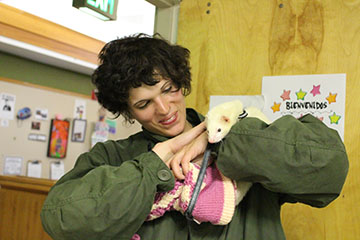T Barnhart, 19, was homeless off and on in Seattle and Spokane for three years. During that time, he had four dogs at different times, which he says helped him a lot.
“Knowing that you have someone to be there 24/7 that you can just talk to and cuddle up next to them and say, ‘Hey we’re pals,’ and you don’t have to worry about them going anywhere?” Barnhart said. “That’s what helps the most.”
Barnhart said he often elected to sleep outside in Spokane so he could keep his dogs with him. Twice during this time, the Spokane County Regional Animal Protection
Service took his dogs away because, he says, someone reported him as homeless and therefore unfit to care for them.
“It felt like they were taking away my kid, that they were taking away my life and my willingness to live,” he said.
A lot of people have walked by people like Barnhart and muttered, “Poor dog,” assuming that homeless people aren’t able to take care of their pets.
However, a study out of Canada found what many social scientists and people who have worked with the homeless have known for years: Homeless youth make great pet parents, and the pets are beneficial for their owners as well.
Bill O’Grady, a professor in sociology and anthropology at the University of Guelph in Ontario and has been studying homeless youth in the Ontario area for 15 years.
As one of the authors and designers of the study, he said they wanted to question the rhetoric around homeless youth and pets.
“One of the misconceptions is that, especially youth — but homeless people in general — shouldn’t have pets, because ‘if they can’t take care of themselves, how could they ever take care of a pet?’” O’Grady said. “But one of the key themes we found in our research was the idea that the pet came first.”
The study compared 189 youth between the ages of 16 to 24 in Ontario, roughly half of whom had pets. The researchers found that homeless youth are three times less likely to be depressed than their peers without pets. The study also found that having the responsibility of a pet led homeless youth to experience less dependency on drugs and alcohol and have a stronger sense of unconditional love.
Barnhart recently moved into subsidized housing in Spokane that allows him to keep Botie, his three-and-a-half year old Red Nose Pit Bull-Australian shepard mix, as a registered service dog. Barnhart says Botie is the sweetest dog and everyone in his building loves him.
However, Barnhart is lucky to have housing that welcomes pets. The study also found that having a pet often inhibits homeless youth from accessing social services, such as shelter and employment.
Susan Fox is the executive director of Peace for the Streets by Kids from the Streets (PSKS), the only homeless youth center and shelter in Seattle that allows all types of pets to stay by the owner’s side while they access services during the day or spend the night.
Fox said the difficult process of finding a permanent home is made even harder with a pet, since most of the low-income housing options in Seattle do not allow pets.
When she started at PSKS four years ago, Fox asked a staff person why some of the patrons didn’t get rid of their pets, so they could have an easier time finding housing. Her coworker pointed out what Fox has come to see proved time and again.
“For many of the kids, this is their family, for many of the kids, this is why they get up in the morning, because they have something to take care of,” she said. “It’s stability for them, it’s companionship, it’s total unconditional love and that’s something they have not had.”
Märi Muzi, 22, spends many of her nights at PSKS (where she is also an intern) with Miyu, her white ferret. Miyu, whom she rescued a couple of weeks ago, loves to climb in and out of the sleeves of Muzi’s green trench coat, slink around her arms and give her love bites, while the bell around his neck jingles.
“This ferret is going to keep me from going overboard, they’re going to give me some other things to do, other than just perhaps wanting to seek out comfort and that homeless cycle, which is mostly just having nothing to do,” Muzi said. “And I think that’s where a lot of people do drugs or other risky behaviors.”
Muzi is happy that she is getting “back into the work loop.” However, her internship will end in a month and she is already thinking about how she will find a job and home for herself and Miyu.
“Ideally I want to get off the streets, with my ferret,” she said. “This is a journey, I gotta figure it out.”
The study was funded by the Ontario Veterinary College at the University of Guelph and published in the March edition of Anthrözoos.
Vol. 31, No. 13
Vol. 31, No. 14
Vol. 31, No. 14
Real Change News is a publication of Real Change Homeless Empowerment Project. © 2021 Real Change.
All rights reserved. Real Change is a non-profit organization advocating for economic, social and racial justice since 1994. Learn more about Real Change and donate now to support independent, award-winning journalism.
Website design and maintenance by OMBU.
Real Change is a registered 501(c)(3) nonprofit. Donations are tax-deductible to the extent allowed by law. EIN 91-1817387.

